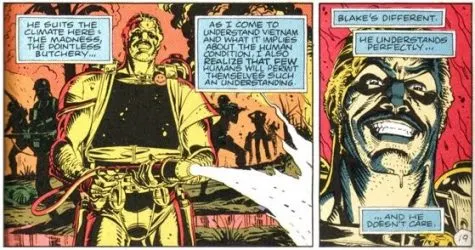The graphic novel presents a world where superheroes exist and have played a role in shaping American history. However, the story challenges the idea of superheroes as unambiguous champions of justice, instead depicting them as flawed and conflicted individuals who are unable to solve the complex problems facing society.
One of the main ways in which the graphic novel critiques American imperialism is through its portrayal of the Vietnam War via nonlinear storytelling.
In the world of Watchmen, America has won the Vietnam War with the help of the superhuman powers of Dr. Manhattan. However, the victory is depicted as hollow and meaningless, with the cost of the war being staggering loss of life and a nation left in ruins. The novel shows how the Vietnam War was not only a military defeat for America, but also a moral and political failure, with the country committing atrocities and engaging in torture and other human rights abuses.
However, the experience leaves him disillusioned with humanity and he ultimately withdraws from the world. Dr. Manhattan's detachment from humanity is a metaphor for the cost of American imperialism, with the country becoming increasingly isolated and disconnected from the rest of the world as a result of its actions.
The character of the Comedian is one of the key figures in the graphic novel's critique of American imperialism. The Comedian is depicted as a ruthless and amoral individual who sees the world as a nihilistic and violent place. He is responsible for numerous atrocities committed in Vietnam, including the murder of a pregnant woman. The Comedian represents the dark side of American imperialism, the willingness to commit unspeakable acts of violence in the pursuit of power and control.
Alan Moore's Watchmen is a searing critique of American imperialism, especially the Vietnam War. The graphic novel shows the consequences of the country's actions in Vietnam, including the staggering loss of life and the moral and political failure.















